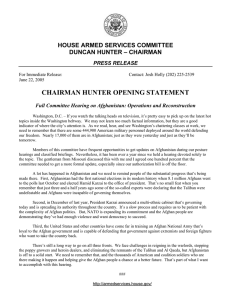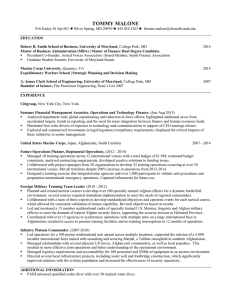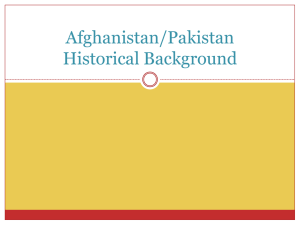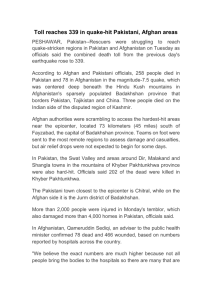Annotated Resource Set (ARS)
advertisement
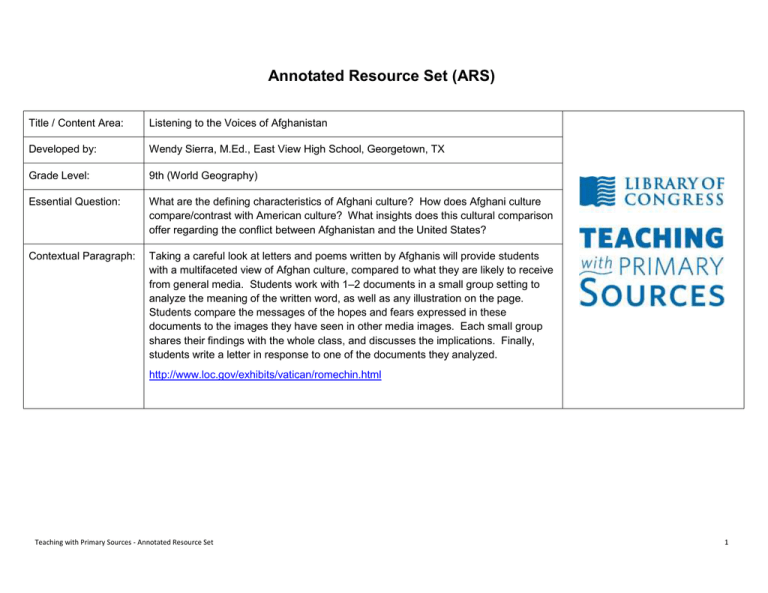
Annotated Resource Set (ARS) Title / Content Area: Listening to the Voices of Afghanistan Developed by: Wendy Sierra, M.Ed., East View High School, Georgetown, TX Grade Level: 9th (World Geography) Essential Question: What are the defining characteristics of Afghani culture? How does Afghani culture compare/contrast with American culture? What insights does this cultural comparison offer regarding the conflict between Afghanistan and the United States? Contextual Paragraph: Taking a careful look at letters and poems written by Afghanis will provide students with a multifaceted view of Afghan culture, compared to what they are likely to receive from general media. Students work with 1–2 documents in a small group setting to analyze the meaning of the written word, as well as any illustration on the page. Students compare the messages of the hopes and fears expressed in these documents to the images they have seen in other media images. Each small group shares their findings with the whole class, and discusses the implications. Finally, students write a letter in response to one of the documents they analyzed. http://www.loc.gov/exhibits/vatican/romechin.html Teaching with Primary Sources - Annotated Resource Set 1 Resource Set Poem from a High School Student Name: Khan Mohammad—Province: Lagman— District: Allengar—Current location: Kabul— Language: Pushtu Letter to Afghani President Karzi Name: Jan Agha Khalqati—Province: Ghazni—Language: Dari Advice Regarding Health Care Name: Unknown—Province: Unknown— Language: Dari Translation of Highlighted Section: Translation of Highlighted Section: You give your light to all, but I suffer away from you, in darkness and separation. I was fresher than a flower in spring, but apart from you in separation, my color turns yellow like a leaf in the fall. http://myloc.gov/Exhibitions/voicesfromafghanistan /voicesofthefuture/Pages/Transcription.aspx?ex=1 @cf352223-7a52-4e16-8c91a69d2d0155e3@7&asset=cf352223-7a52-4e168c91-a69d2d0155e3:f10f806f-9def-4f45-b6a0e48c6bd12ef4:21 Teaching with Primary Sources - Annotated Resource Set I want President Hamid Karzai to have a mobile phone and, whenever he has time, receive calls from people and listen to their complaints. Or at least he should have a private postal address and receive those complaints through the post. A committee consisting of honest people who sympathize with Afghanistan should be appointed in order to monitor the money donated by the international community to Afghanistan. The money should be spent based on certain identifiable priorities. We have marvelous houses and castles—used only as government offices. At the same time, there are people who are starving. This will deepen the gap between the people and the government. http://myloc.gov/Exhibitions/voicesfromafghanistan/technologyfro ntier/Pages/Transcription.aspx?ex=1@a93cc1b0-f547-44d1-aa72d4037cb22ecd@2&asset=a93cc1b0-f547-44d1-aa72d4037cb22ecd:1b7b0271-9aed-4aed-bbd2-721d9c08dffe:5 Translation of Highlighted Section: I am writing to give advice regarding health care for those suffering from stomach ulcers. Those who suffer from stomachaches should eat only food that is soft and light. They should eat fresh yogurt and sweets, and avoid all carbonated drinks because they are acidic. They should drink at least two glasses of fresh milk a day, and avoid nuts, fruits with peel such as oranges and lemons, which increase the level of acidity in the body, as well as vinegar, sour meals, very cold water, oily food, and smoking cigars. http://myloc.gov/Exhibitions/voicesfromafghanis tan/acontinuingtradition/Pages/Transcription.as px?ex=1@e41b361e-ae0d-4a45-b9e34550c5260378@4&asset=e41b361e-ae0d-4a45b9e3-4550c5260378@6e4e4cab-6eb5-41e59c8f-0bd963f11c1e@32 2 Letter from a Prisoner Name: Abdul Ghafoor Farahi—Province: North Balochistan—District: Balochistan—Current location: Pakistan—Language: Pushtu Translation of Highlighted Section: First, all of us prisoners send Eid greetings to the entire team of Radio Azadi and to all of its listeners as well. I have been living in a prison in North Balochistan, in the Pakistani central jail, for the last ten years. I listen to all your programs almost daily, and find them very interesting. Until now, however, Radio Azadi has never invited an Afghan official, minister or senator to discuss the problems of Afghan prisoners in Pakistani jails. I kindly request that Radio Azadi inform Afghan officials of our plight and convey our message to them. Finally, I request a song by Sarfaraz http://myloc.gov/Exhibitions/voicesfromafghanistan/req uestsforaction/Pages/Transcription.aspx?ex=1@590f38f f-6ea4-44b9-a0fd-7bf6f00b93f0@4&asset=590f38ff6ea4-44b9-a0fd-7bf6f00b93f0:3b2c935b-171a-4033ad4c-de37cf27ab1a:25 Teaching with Primary Sources - Annotated Resource Set Computer Generated Correspondence “Why Can’t They Find Osama Bin-Laden?” Name: Ahmad Zaher—Province: Unknown—District: District of Kabul—Language: Pushtu Name: Abdallah Nadzai—Province: Unknown— Language: Dari Translation of Highlighted Section: Translation of Highlighted Section: We have been promised food and civilian aid, on a number of occasions. We were also requested to prepare lists of the poor and the needy in our village in order to give priority [in aid assistance] to the neediest. We witnessed several such promises and the winter passed, but no one saw even a seed being given to anyone. No one knows what happened to the aid we were promised. When the U.S. and British decided to crush the Taliban, they bombed them and drove them out in just a few days. Why can’t they now find Osama Bin-Laden, Mullah Omar, and Gulbuddin Hekmatya? I think they don’t want to capture these people; otherwise they could do so in one night. We really don’t know why the government is daydreaming. Do we have a government or not? Is the government looking out for its own survival by betraying the people and breaking its promises? How can I request that you play a song when I am starving to death? We need mercy and help, so please try to discuss our problems further with our government officials. http://myloc.gov/Exhibitions/voicesfromafghanistan/requestsfora ction/Pages/Transcription.aspx?ex=1@590f38ff-6ea4-44b9-a0fd7bf6f00b93f0@3&asset=590f38ff-6ea4-44b9-a0fd7bf6f00b93f0@3b2c935b-171a-4033-ad4c-de37cf27ab1a@9 http://myloc.gov/Exhibitions/voicesfromafgha nistan/requestsforaction/Pages/Transcription. aspx?ex=1@590f38ff-6ea4-44b9-a0fd7bf6f00b93f0@2&asset=590f38ff-6ea4-44b9a0fd-7bf6f00b93f0@3b2c935b-171a-4033ad4c-de37cf27ab1a@13 3 Foundations Annotations Curriculum Connections Social Studies (World Geography/Current Events)- looking at cultures and conflict. Language Arts- prose and poem analysis. Visual Arts- illustrations surrounding the letters and poems reveal both cultural context as well the artistic sensibility of Afghanistan. Curriculum Standards Texas Essential Knowledge and Skills for World Geography (14) Government. The student understands the geographic processes that influence political divisions, relationships, and policies. The student is expected to: (C) explain the geographic factors that influence a nation’s power to control territory and that shape the foreign policies and international political relations of selected nations such as Iraq, Israel, Japan, and the United Kingdom. (15) Citizenship. The student understands how different points of view influence the development of public policies and decision-making processes on local, state, national, and international levels. The student is expected to: (A) identify and give examples of different points of view that influence the development of public policies and decision-making processes on local, state, national, and international levels; (B) explain how citizenship practices, public policies, and decision making may be influenced by cultural beliefs; and (C) compare different points of view on geographic issues. (16) Culture. The student understands how the components of culture affect the way people live and shape the characteristics of regions. The student is expected to: (C) compare life in a variety of cities and nations in the world to evaluate the relationships involved in political, economic, social, and environmental changes. (17) Culture. The student understands the distribution, patterns, and characteristics of different cultures. The student is expected to: (A) describe and compare patterns of culture such as language, religion, land use, systems of education, and customs that make specific regions of the world distinctive; and (B) compare economic opportunities in different cultures for women and religious minorities in selected regions of the world. (18) Culture. The student understands the ways in which cultures change and maintain continuity. The student is expected to: (A) describe the impact of general processes such as migration, war, trade, independent inventions, and diffusion of ideas and motivations on cultural change; (B) analyze cultural changes in specific regions; (C) analyze examples of cultures. Content & Thinking Objectives By taking a close look at letters and poems written by Afghanis, students gain a multifaceted view of Afghan culture compared to what they are likely to receive from general media. Teaching with Primary Sources - Annotated Resource Set 4 Inquiry Activities & Strategies Students work with 1–2 documents in a small group setting to analyze the meaning of the written word, as well as any illustration on the page. Students compare the messages of the hopes and fears expressed in these documents to the image they have seen in other media images. Each small group shares their findings with the whole class and discusses what they have discovered. Assessment Strategies Finally, students write a letter (and possibly an illustration) in response to one of the documents they analyzed. Other Resources Web Resources Library of Congress, Voices of Afghanistan Exhibition: http://www.loc.gov/exhibits/vatican/romechin.html Secondary Sources Extend lesson by comparing letters/poems to news articles (Up Front Magazine)/video reports (CNN or BBC) of recent events in Afghanistan. Print and Other Media Resources Extend lesson by students writing a persuasive letter to a public official (congressional rep., senator, president) detailing their position on US continued involvement in Afghanistan. Use as a classroom activity in concert with reading/project on Kite Runner or Thousand Splendid Suns. Teaching with Primary Sources - Annotated Resource Set 5
